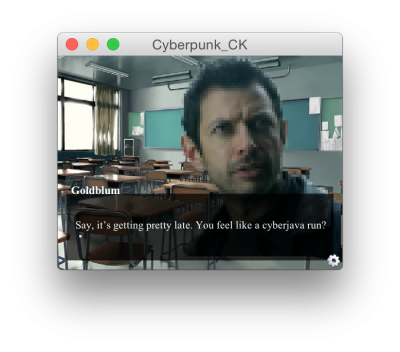-
Content count
12 -
Joined
-
Last visited
Posts posted by Molten Berle
-
-
Stellar episode. Great to hear Gita - have I missed other episodes with her appearing, or is this the first?
In any case, great discussion.
-
Also, had two questions for the podcast (and listeners):
First, what are the most exciting cards you've never been able to put into use? Especially given the amazing level of weirdness we're seeing in Liberated Mind (I actually laughed at the ridiculousness of a couple cards when I first opened my pack), there are bound to be a few amazing ones that you've always wanted to work into a deck but have never managed.
Second, what cards have you found yourself going to less and less as other cycles/packs have come out? I've personally found myself moving away from Fetal AI in my Jinteki decks as time has gone on, despite its having been absolutely vital when it first came out.
-
An interesting article about the history of vanilla: How vanilla became shorthand for bland.
But the vanilla that wearies us is rarely vanilla at all. Anywhere from 90 percent to 97 percent of vanilla-flavored products are made with vanillin, a substance found in small quantities in natural vanilla but made synthetically for processed commercial foods. Real vanilla contains hundreds of different components that contribute to its nuanced taste and aroma. It is as different from vanillin as sugar is from Equal; vanilla possesses subtlety and depth, while vanillin is loud, brassy, superficial.
Also, Ed Harrison (of T7 music fame) is soundtracking one of the modes in the new Deus Ex! Hopefully he becomes the new go-to cyberpunk/cybernoir/etc composer, because he deserves it.
-
-
For film theory, look at the works of David Bordwell. Film Art, Film History, and The Way Hollywood Tells It are all tremendously insightful and well-researched books that cover the development of film aesthetics and styles over the past century.
For design in general, Norman's Design of Everyday Things is phenomenal. It's more about industrial/product design, but the book is centered around the idea of designers realizing that current methods of accomplishing a task are only that way because nobody has given them further thought since their inception.
For graphic design, I'd recommend going into the least secure bookstore you can find and grabbing every Phaidon publication on their shelves.
-
I think it depends largely on the extent to which you do it and whether or not you're making any assertions that the content was wholly created by you.
If I'm working on a noncommercial personal project (or an internal mockup of something) and need some graphics/sounds/etc, I'll certainly toss in a handful of unlicensed elements with the aim of getting the desired effect when moving out of the greyboxing stage. If and when those projects ever start getting to the stage where they'll be evaluated as my original work - my selling them, utilizing them publicly in a commercial way, presenting mockups to a client, etc. - I'll take the time to go through and look at all the content. If something isn't mine, I'll look at whether I can license it (or adapt it under the creator's CC permissions), or - barring that - instead creating or licensing a similar commercially-available version. Regardless of whether it's illegal or unlawful, taking someone's work and letting others believe it's my own is something I'm just not comfortable with, just as I wouldn't be comfortable with someone else taking credit for mine.
Regarding the remixing/sampling element, that (for me) comes down to whether you're doing anything innovative with it. If I'm going to make a platformer, I won't just use sprites from Super Mario World, unless said platformer specifically requires them to make some sort of point (don't know what that would be, but you get the idea). In those cases, at the very least, I would compile and list the origins of the content in an accessible place (credits screen, readme file).
EDIT: In a case like your Zine design, where the usage of content is part of the point, I'd probably go through the files and attribute them as best as I could, ideally replacing those I couldn't find any source on. That way, despite the fact that you're not entirely within the realm of IP law, you're at least crediting them with their work. Additionally, it gives them an opportunity to locate the usage of their work and to request you remove it, should the usage concern them.
-
I haven't used any of the the javaScript functionality. Can you describe your experience with it?
It's a little rough. The app lets you just put in JS code, but throws up errors when you use a var. Which... makes a lot of things difficult, unless you nest everything in horrifying tangles of code.
-
Well, that didn't go so great. Had to hack out a bunch of the procedural generation for it to stop throwing JS errors, and as such lost a bunch of the mission generation. Still, made a thing and it's real now, so that's cool. Hopefully I'll have a chance in the next few days to get the procedural stuff back in.
-
I'm a sucker for noir sax cyberpunk music. Most of my time on Soundcloud is spent looking for more of it than the Blade Runner OST. I'm also excited to see another visual-novel in the mix, or atleast a game that uses TyranoBuilder.
So far I'm pretty impressed with its capabilities. Putting together a basic novel is super easy, and I've been able to get a decent amount of semi-procedural randomization/mission generation in as well thanks to JavaScript (and some of their TyranoScript).
-
-
Okay, haven't had a ton of time to work out the details, but hopefully will have something finished up over the weekend.
Right now, about two thirds of the way through a combination detective narrative and hacking minigame, where you're a cybercop finding the dirty people on the force who killed your partner, and proceeding to hack their computers to find incriminating information and/or make said computers explode and kill them. The writing part is about done, still trying to figure out how to fix the mechanics of the minigame so that there's some level of difficulty (and punishment for failure).
I did spend way too much time composing and recording a Korg-MS20-and-smoky-sax theme song, which I'll upload later today or tomorrow.
ADDENDUM: Issues with Logic export have meant issues with getting the theme out, but I'm still working on it. What of a game I finished is here: http://molten-berle.itch.io/cyberpunk-cop-killer




Important If True 3: The Power of 45 Brains
in Important If True Episodes
Posted
Tomes and Talismans sounds awesome.
New Yorker ran an article on it in 2010, apparently, and at least a few episodes are up on YouTube.